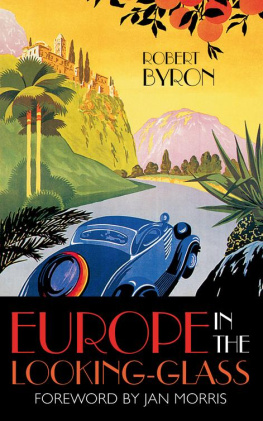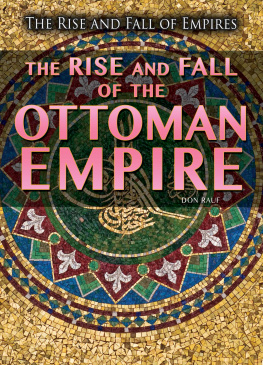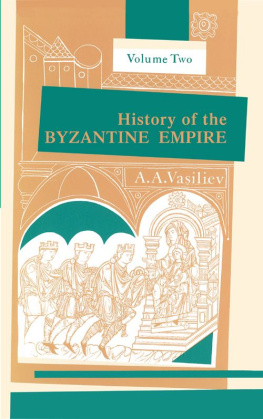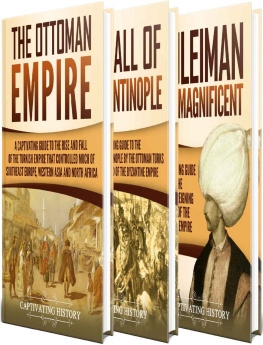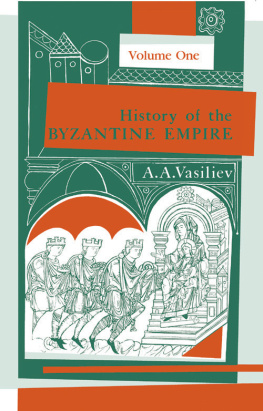Routledge Revivals
The Byzantine Achievement
First published in 1929, this highly influential study offers a historical perspective on the Byzantine Empire, from the establishment of Constantinople by Emperor Constantine around 330 AD, through to the fall of Constantinople at the hands of the Ottoman Empire in 1453 AD.
Byrons work considers the empire in its entirety, assessing the highs and lows across a thousand year period. He provides insights into trade, culture, the organs of state, religion, the imperial rulers, and the battle with the Ottoman Empire, which would ultimately end in the fall of the Byzantine Empire.
The Byzantine Achievement
An Historical Perspective
A.D. 330-1453
Robert Byron

First published in 1929
by George Routledge & Sons Ltd
This edition first published in 2011 by Routledge
2 Park Square, Milton Park, Abingdon, Oxon, OX14 4RN
Simultaneously published in the USA and Canada
by Routledge
711 Third Avenue, New York, NY 10017
Routledge is an imprint of the Taylor & Francis Group, an informa business
All rights reserved. No part of this book may be reprinted or reproduced or utilised in any form or by any electronic, mechanical, or other means, now known or hereafter invented, including photocopying and recording, or in any information storage or retrieval system, without permission in writing from the publishers.
Publishers Note
The publisher has gone to great lengths to ensure the quality of this reprint but points out that some imperfections in the original copies may be apparent.
Disclaimer
The publisher has made every effort to trace copyright holders and welcomes correspondence from those they have been unable to contact.
A Library of Congress record exists under ISBN: 29017338
ISBN 13: 978-0-415-80917-7 (hbk)
ISBN 13: 978-0-203-12739-1 (ebk)
The Byzantine Achievement
ROBERT BYRON
The
Byzantine Achievement
AN HISTORICAL PERSPECTIVE
A.D. 3301453

First published in 1929
Reprinted in 1987 by
Routledge & Kegan Paul Ltd
11 New Fetter Lane, London EC4P 4EE
Published in the USA by
Routledge & Kegan Paul Inc.
in association with Methuen Inc.
29 West 35th Street, New York, NY 10001
Set in
by
and printed in Great Britain
by Billings & Sons Ltd.
Worcester.
No part of this book may be reproduced in any form without permission from the publisher except for the quotation of brief passages in criticism
ISBN 0-7102-1392 1
Foreword
In April 1926 Robert Byron wrote to his mother describing the state of his literary affairs. His first book, Europe through the Looking Glass, had been accepted by Duckworths and was in proof. It was an account of a journey by motor car from London to Athens by way of Grimsby, Berlin, Bologna, Florence and Brindisi. The tone was light-hearted, though a sprinkling of somewhat portentous admonitions, reminding age that the future lay with youth, struck the authentic note of undergraduate solemnity. Now he proposed to embark on another, The Byzantine Survival, and to change publishers:
Routledges have given me a contract I saidthis to the senior partnerMy idea is to make popular history of the style of Lytton Strachey or Guedalla. Oh Noo, Noo, Mr Byron, replied he. Nothing so ephemeral as that. This book I wish to see take a permanent place among the classics of history. Books such as you mention are no good either to their authors or their publishers.
So now it is settled I think that once this first one is published everything will be all right. Then on top of that there will be something solid about producing an abstruse historical classic at the age of 21so different to the usual young writer of today....
Mr Stallybrass of Routledges must have been a somewhat humorous publisher to anticipate that a man just down from Oxford with a third in history would deliver him an enduring masterpiece in twenty months. In the event Stallybrass had to wait a year longer for the manuscript, and the outcome was a book which did not answer to his ambitious brief. But if it has no obvious standing as a classic of history The Byzantine Achievement, as it was finally to be called, continues to provide an informative and provocative view of its subject, and to be essential to an understanding of Byrons career and his later, more obviously remarkable writings.
The changes of title are significant. Byron had started to work on a synopsis of the book shortly before his twenty-first birthday. It began as Keepers of Byzantium: an historical perspective 33014531923, then became, variously, Keepers of the Levant, The Byzantine Survival (which is where Mr Stallybrass came in), The Byzantine Succession, Byzantine Civilization and finally, a change in proof, maddening to his publisher, The Byzantine Achievement. One fault which Byrons enemies (and he was to acquire a fair number) could not have charged him with was indecision: why, then, the uncertainty?
Part of the explanation is to be found in the disingenuousness of his remark to Stallybrass. He had never intended The Byzantine Achievement to be a popular historynor, for that matter, did he have any liking for the work of Lytton Strachey. As he explains in his Authors Note, what he at first had in mind was a history of the Eastern Mediterranean between the years 1919 and 1923. Whether history would have served in 1926 for a treatment of an issue as immediate (one cannot say topical, since Byrons basic contention was that what ought to have been a burningly topical issue had been deliberately misrepresented, in Western Europe, as a matter of no significance) is of course questionable. But he was forced into the past, as others had been before him and have been sinceTolstoys novel about the Decembrists which became a novel about 1812 must be the definitive examplein order to begin to explain why he felt about his starting point as he did.
Byron had toyed with the idea of a popular work both because he wished to share his convictions with as many readers as possible and because he needed money, again a topic which he mentions, with a frankness uncommon amongst authors, in his introductory Note. He was fortunate in having a small private income, but was disinclined to see his situation in that light since most of his friends from school and university enjoyed far greater means. He looked to writing for his livelihood, and had already been earning from his editorship of the Cherwell (the voice of Oxfordian unorthodoxy) and, when he could place them, articles in the London press. The Times and the Tatler had accepted his work, and he had used the Cherwell as a springboard into metropolitan journalism. Nevertheless, despite professionalism, phenomenal energy and good contacts, he always lacked one decisive qualification for popularity: willingness to tell people what they wanted or expected to be told. No one who really sought popularity could have perpetrated the first chapter of The Byzantine Achievement, nor, for that matter, the first chapter of First Russia, then Tibet. The one incidentally envisages space travel and television, the other is a meditation on the profoundest causes of the Russian condition; both are abstruse, both at points come close to impenetrability, since in them Byron is explaining things to himself. His strong opinions, and his combative exposition of them, might suggest that life presented itself to him in simplistic terms. This was not at all the case, and the interplay of oppositions out of which his views emerge is part of his fascination.
Next page

